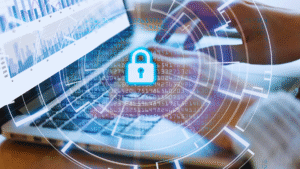In today’s digital landscape, gamers face unique cybersecurity threats that can compromise personal information and disrupt gaming experiences. Keeping data safe requires understanding potential hazards and implementing effective security measures. With gaming communities constantly evolving and hackers becoming increasingly sophisticated, knowledge about cybersecurity is essential for anyone who regularly engages in online gaming.
Many gamers might overlook basic security practices, assuming their data is automatically protected. This perception can lead to dangerous vulnerabilities, making it crucial to recognise the importance of data safety. By adopting proactive strategies such as strong passwords, two-factor authentication, and regular updates to software, players can significantly enhance their online security and protect sensitive information.
The world of gaming is not just about enjoyment; it also requires vigilance against cyber threats. As gamers learn to navigate these risks, they empower themselves and support a safer gaming culture. Staying informed and proactive will ensure enjoyable and secure gaming experiences in an increasingly connected environment.
Why Cybersecurity Matters for Gamers
In the digital gaming landscape, understanding the implications of cybersecurity is essential. Gamers face unique challenges, including online threats and privacy issues that can significantly affect their experience and personal safety.
The Risks of Online Gaming
Online gaming presents various risks, including hacking, phishing, and DDoS attacks. Cybercriminals often target gamers for personal gain, exploiting vulnerabilities in games and networks. Insecure accounts can lead to unauthorised access and financial loss.
Gamers should be aware that their usernames and passwords can be easily obtained through data breaches or social engineering tactics. A lack of awareness about these risks can result in compromised accounts and stolen identities.
To enhance security, players should regularly update their passwords and enable two-factor authentication (2FA) whenever possible. This adds an extra layer of defence against potential attacks.
Personal Data and Privacy Concerns
Gamers frequently share personal information while playing or on gaming platforms. This data can include names, email addresses, and payment details, making them attractive targets for hackers.
Privacy policies of various games and platforms may not always protect this information adequately. Gamers must ensure they recognise what data is being collected and how it is being used.
Using pseudonyms or usernames instead of real names can help mitigate personal data exposure. Reviewing privacy settings and understanding the implications of sharing information is crucial for protecting personal privacy.
Impact on Gaming Experience
Cybersecurity issues can severely affect the overall gaming experience. Disruptions due to cyber attacks, such as server outages or data loss, can frustrate players and lead to decreased enjoyment.
Furthermore, having to navigate security concerns can detract from immersive gameplay. Continuous alerts about potential threats can undermine focus and engagement.
A safe gaming environment encourages community building and collaboration. Players are more likely to participate in online discussions and events when they feel their personal data is secure and their gaming experience is uninterrupted.
Common Cyber Threats Targeting Gamers
Gamers face various cyber threats that can compromise their personal safety and data integrity. Understanding these threats is vital in promoting better security practices within the gaming community.
Phishing and Social Engineering Attacks
Phishing occurs when attackers use deceptive emails or messages to trick gamers into revealing sensitive information, such as login credentials. These scams often mimic legitimate gaming platforms or social media accounts, making it difficult for users to identify the threat.
Social engineering attacks exploit human psychology to gain trust and manipulate individuals. Attackers may pose as friends or technical support, asking for personal information or access to accounts. Recognising these tactics is crucial for gamers to protect their identities and maintain secure gameplay.
To safeguard against phishing:
- Verify sources: Always check the sender’s email address.
- Look for errors: Phishing messages often contain spelling mistakes or unusual requests.
- Use two-factor authentication: This adds an extra layer of security to accounts.
Malware and Viruses
Malware refers to malicious software designed to damage, disrupt, or gain unauthorised access to devices. Gamers are frequent targets for malware attacks that can steal personal information or compromise game accounts.
Viruses can be hidden in downloads, such as game mods or cheats, often leading to identity theft. This loss of information can result in unauthorised transactions or the loss of access to accounts.
To minimise the risk of infection:
- Install reputable antivirus software: Regularly update to protect against new threats.
- Be cautious with downloads: Only download games and add-ons from trusted sources.
- Regularly update software: Keeping systems updated helps patch vulnerabilities that malware can exploit.
Awareness of these cyber threats is vital for maintaining a secure gaming experience.
Effective Cybersecurity Strategies for Gamers
Gamers must take proactive measures to safeguard their personal data. Employing effective cybersecurity strategies can significantly reduce risks associated with online gaming.
Using Multifactor Authentication
Multifactor authentication (MFA) adds an extra layer of security by requiring two or more verification methods. For gamers, this typically involves combining a password with a mobile authentication code or biometric verification.
Many gaming platforms offer MFA. Enabling it is crucial. This approach minimises the chances of unauthorised access, even if a password is compromised. When setting up MFA, follow the platform’s guidelines carefully and ensure that backup recovery options are also in place.
Regularly check for any unauthorised attempts to access accounts. Users should receive notifications for sign-ins from new devices. This vigilance can help detect cyber threats early.
Selecting and Updating Antivirus Software
Choosing the right antivirus software is essential for online safety. Gamers should look for programmes that provide comprehensive protection against malware, spyware, and phishing attacks.
Key features to consider include:
- Real-time scanning
- Automatic updates
- Protection against ransomware
Regular updates ensure that the software can defend against the latest threats. Gamers should schedule scans and keep their software updated to maintain optimal protection.
Furthermore, some antivirus solutions offer gaming modes that limit notifications and system scans while gaming, providing a smoother experience.
Strengthening Passwords and Account Management
Creating strong, unique passwords is vital for account security. Passwords should include a mix of uppercase and lowercase letters, numbers, and symbols.
A recommended practice is to use a password manager to store and generate complex passwords. This reduces reliance on memory and decreases the likelihood of using easily guessable passwords.
Account management is equally important. Gamers should regularly review their account settings for privacy options. Restricting the visibility of personal data can help mitigate risks.
In case of any breach or irregular activity, changing the password immediately is critical. Prompt action can prevent further issues, ensuring that gaming experiences remain enjoyable and safe.
Maintaining Ongoing Online Privacy
To secure data effectively, individuals must understand the importance of limiting data sharing and protecting personal information from identity theft. Implementing robust practices can significantly enhance their online privacy.
Limiting Data Sharing and Human Error
Minimising data sharing is crucial for preventing unwanted exposure. Users should regularly review the permissions granted to applications and platforms. Disabling unnecessary permissions can help reduce the amount of personal information shared.
Use privacy settings to restrict access to profiles and gameplay activities. Opting out of data collection features offered by some games can further safeguard privacy.
Human error often leads to unintentional data leaks. It is vital to educate oneself about phishing attempts and social engineering tactics. Simple practices like avoiding suspicious links and verifying sources before sharing can mitigate these risks.
Protecting Personal Information from Identity Theft
Identity theft is a pressing concern in the digital landscape. Gamers should refrain from sharing personal information, such as addresses or phone numbers, in forums or chats.
Using strong, unique passwords is essential. A combination of uppercase and lowercase letters, numbers, and special characters can make passwords more secure.
Two-factor authentication (2FA) adds an extra security layer. Whenever possible, users should enable 2FA for their accounts.
Monitoring financial statements for unauthorised transactions is important. Regularly checking accounts can help in detecting potential identity theft early. Users should also consider using secure networks and VPNs to further protect their data when gaming online.




